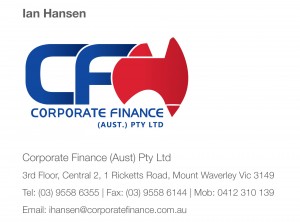Corporate Finance – Managing your insurance premiums

IAN HANSEN, Director of Corporate Finance (Aust) Pty Ltd, outlines a practical way to address the funding of your insurance.
All business owners have a legal obligation to insure employees against accidents and work related illness, but paying premiums in a lump sum puts pressure on cash fl ow and takes valuable working capital out of the business. Have you also noticed how the annual insurance premium inevitably falls due when cash fl ow is tight?
Did you know there is short term business finance available to let you spread a lump sum annual insurance premium across monthly instalments?
Workers compensation
Workers compensation is a form of insurance providing wage replacement and medical benefits to employees injured in the course of employment in exchange for mandatory relinquishment of the employee’s right to sue for negligence.
State to state
Workers compensation schemes are regulated by state governments. As such, they are administered in different ways and insurers may have different roles.
- In Western Australia, Tasmania, Northern Territory and the ACT, insurers privately underwrite the scheme;
- In NSW, Victoria and South Australia, insurers operate as scheme agents on behalf of the government authority; and
- In Queensland, the scheme is operated entirely by the state.
In the ACT, Northern Territory, Queensland and Victoria the governing bodies are called WorkSafe. In NSW, South Australia, Tasmania and Western Australia they are known as WorkCover.
Workers compensation premiums vary from industry to industry. They are based on a percentage of the gross salary. Industry classifications and rates reflect the claims experience of each industry. Rates can vary from under 1% to over 4%.
How can you save?
In some states there is a discount for paying up front. Interest on the premium funding can be very low when you add up what you save.
In Victoria, payment by 1 August attracts a 5% discount. If you pay by 1 October, you will receive a 3% discount. In NSW, if you pay your annual premium in full on or before the due date, small employers receive a discount of 5%. For medium and large employers the discount is 3%. There are no discounts in Queensland but employers are able to pay their premium over 12 instalments and select a monthly deduction date suitable for their business.
Depending on your state, savings generally kick in at around the $15,000 premium level with the interest often less than the saving gained by early payment. There are a raft of other benefits to be gained.
What are other benefits?
Insurance premium funding has been available in Australia for over 20 years and covers a range of business insurances. Key benefits to a small business owner include:
- It frees up working capital allowing you to take advantage of income producing opportunities when they arise;
- Installment payments smooth out cash flow;
- One monthly payment can fund multiple insurance policies such as workers compensation, professional indemnity, public liability and motor vehicle insurance;
- It allows the customer to maintain existing fi nance facilities;
- Funding is fast, quick and easy;
- Flexible payment options are available; and
- Payments may be tax deductible, depending on the customer’s circumstances.
Premium funders charge fixed commercial interest rates and generally do not require any tangible security, other than the right to cancel the underlying policy if payments are missed.
Premiums can be spread over six to 12 equal monthly installments. People often choose 10 installments, as this provides a two month ‘holiday’ before the next insurance due date.
Call to Action – Workers compensation deadlines and discounts vary from state to state so calculating the cost of insurance premium funding can be confusing. We encourage you to call our office today and talk to our experts about the possible benefits to your business.










You must be logged in to post a comment Login